I have written about Lysander Spooner quite a few years ago. It has been awhile. I think it is time again to revisit this eccentric and brilliant historical figure. Those of you that have not heard of him or perhaps you may have heard of him as the nutty guy who attempted to compete with the U.S. Postal Service. That is usually the limit of what people learn about him if they learn anything about him at all. He was so much more than that. If we mine his works of literature, speeches, court cases, and more they are a veritable treasure trove of wise quotations. I will be providing many images I pull from various image sites that represent quotations from this man. Yet I would also like to tell you a little bit more about him than just the fact he competed with the U.S. Postal Service.
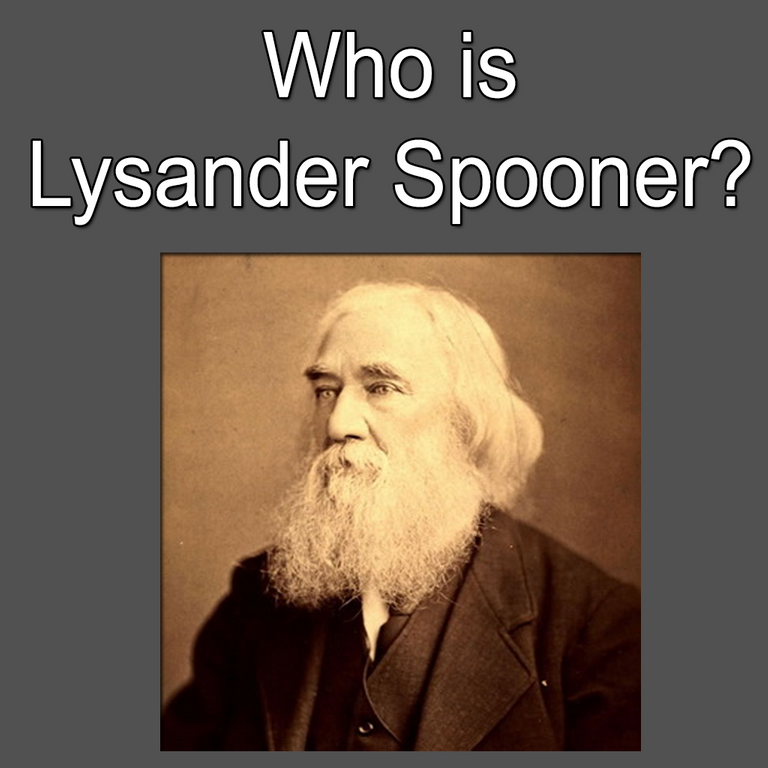
Lysander Spooner was born in 1808 and died in 1887. He thus was not someone we would call a "Founding Father". In some sense he might be an "Unfounding Father" yet don't let your mind jump to conclusions just yet. He was a wise man who truly cared the most about freedom. He cared strongly about freedom for everyone. This put him at odds with some of the founding principles of the United States. Yes, that is where this particular historical figure was active. He was active in the United States,
He is called by the Mises Institute an American individualist anarchist and legal theorist.
Wikipedia on the other hand refers to him as an American individualist anarchist, an abolitionist, entrepreneur, essayist, legal theorist, pamphletist, political philosopher, Unitarian, writer and a member of First International.
In this case I actually like Wikipedia's description. Lysander Spooner is someone I didn't know about but I have admired him, his works, and the things he tried to do since I discovered him a little over half a decade ago.
Lysander's father was a Deist which is what I myself claim to be. Other noteworthy people that were Deists were Thomas Jefferson, and Thomas Paine. Being raised by such a father the free thinking, and make up your own mind type of approach that I have raised my children when it comes to religion is likely similar to the environment Lysander was raised in. Though Wikipedia does state Lysander was a Unitarian. That isn't that far of a leap from Deism. Before I became aware of Deism about the only church I was considering attending is what is known as Unitarian Universalist otherwise known as UU. In the modern time the Unitarian movement of which Lysander was part of has merged with the Universalist movement. This is where UU comes in. It is still too formal even for my liking. It is highly tolerant of different religious perspectives and welcomes all faiths, but I myself do not believe in revelation, or religious texts as being the word of God. To me they are the word of man attempting to explain observations about God. For me Deism does the trick. That is the last I am likely to say about religion and Lysander unless in my journey to tell you more about him I come across any noteworthy quotes or moments that are related to it.
Legal Career
Lysander Spooner was an attorney who studied under numerous prominent Lawyers, and Governors of the time. Yet he never attended college. By law college graduates had to study for three years under attorneys. Non-College Graduates were required to study for five years under attorneys. Yes, you read that correctly. No college required. Yet by law if you did attend college you didn't have to study as long under attorneys. Lysander began his activism related to this.
With the support of his mentors he became a lawyer after only three years studying under them and without attending college. Already the rebel...
Wikipedia stated the following with regards to the three years given to college graduates only:
He regarded the three-year privilege for college graduates as a state-sponsored discrimination against the poor and also providing a monopoly income to those who met the requirements. He argued that "no one has yet ever dared advocate, in direct terms, so monstrous a principle as that the rich ought to be protected by law from the competition of the poor".
In 1836 the legislature abolished the restriction. If you read the works of Lysander and as you encounter the quotes which I will be sharing shortly you will likely notice he was a man of very quick and unique mind. He was likely not someone people were too keen to cross mental swords with. His mind seems to be the type that would welcome such an exchange. It is also likely why his mentors encouraged him to open his law practice in Worcester, Massachusetts even though he was two years short of the current legal requirements.
He opposed all licensing requirements for lawyers, doctors, or anyone else that was prevented from being employed by such requirements. For Spooner, to prevent a person from doing business with a person without a professional license was a violation of the natural right to contract. Spooner advocated natural law, or what he called the science of justice, wherein acts of initiatory coercion against individuals and their property, including taxation, were considered criminal because they were immoral, while the so-called criminal acts that violated only man-made arbitrary legislation were not necessarily criminal.
If he is looking at the world today he must be trembling with rage in his grave. There is more of this type of discrimination and authoritarianism in the world today than anyone from his age likely even could have imagined.
By 1840 his legal career had failed. He returned to his father's farm.
American Letter Company
Now in 1844 the event occurred that people often learn about in history if they learn anything at all about this man. The United States Post Office had a monopoly on postage. As such they were charging a VERY HIGH postal rate.
Lysander opened the American Letter Company which offered far better rates than the USPS. In fact, the USPS finally had to lower its own rates to compete with Lysander's business. His business was actually quite good at what it did though it would eventually be made insolvent by the legal challenges that the government kept sending his way. Then in 1851 the government enacted a law which strengthened the government monopoly and put him out of business.
Abolitionism
Lysander was a very active, and outspoken abolitionist. He published a book in 1845 with the title The Unconstitutionality of Slavery.
Although he recognized that the Founding Fathers had probably not intended to outlaw slavery when writing the Constitution, Spooner argued that only the meaning of the text, not the private intentions of its writers, was enforceable.
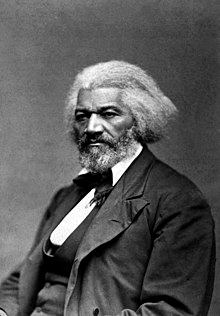
(Image Source: Historical Archives and Wikipedia)
Frederick Douglass, originally a Garrisonian disunionist, later came to accept the pro-Constitution position and cited Spooner's arguments to explain his change of mind.
Lysander Spooner actively campaigned against slavery from 1845-1861. He published pamphlets on Jury Nullification and other legal defenses. These would be used by escaped slaves whom he would often offer his legal services to free of charge.
Although he had advocated the use of violence to abolish slavery, Spooner denounced the Republicans' use of violence to prevent the Southern states from seceding during the American Civil War. He published several letters and pamphlets about the war, arguing that the Republican objective was not to eradicate slavery, but rather to preserve the Union by force. He blamed the bloodshed on Republican political leaders such as Secretary of State William H. Seward and Senator Charles Sumner, who often criticized slavery yet would not attack it on a constitutional basis, and who pursued military policies seen[by whom?] as vengeful and abusive.
His Works
Lysander influenced a lot of people and someone could likely make a pretty cool documentary or movie about this man. It would be serious at times, crazy funny at others, and ultimately a clash of mind versus government.
I am going to link to a lot of his works as provided by the Mises Institute(Some via Wikipedia). I will point out the ones I personally thought were worthy reads even today. I haven't read them all. They likely are all worthy in their own way.
I will also share a bunch of quotes in MEME type form at the end. I am not going to cite where all the images come from as they are all simply people slapping his photo with a quote he said or something along those lines. I could do that too but since it is not their own original work why spend time doing what others have already done. I will not be stealing their work.
- 1834 - "The Deist's Immortality, and An Essay on Man's Accountability for His Belief
- 1836 - "The Deist's Reply to the Alleged Supernatural Evidences of Christianity"
I find those two particularly interesting having not read them yet. Wikipedia refers to him as a Unitarian. Yet here are his two earliest works and they are from the perspective of a Deist like Lysander's father and myself.
- 1843 - "Constitutional Law, Relative to Credit, Currency, and Banking"
- 1844 - "The Unconstitutionality of the Laws of Congress, Prohibiting Private Mails"
- 1846 - "Poverty: It's Illegal Causes, and Legal Cure"
That one I suspect would be some food for thought for many of you thinkers out there.
- 1850 - "Illegality of the Trial of John W. Webster"
- 1852 - "An Essay on Trial By Jury"
- 1855 - "The Law of Intellectual Property"
I haven't read that one yet. I intend to though as I want to see what Lysander's thoughts were on the topic that so controls much of our society today.
I wonder if they talk about Lysander Spooner much during Black History Month since he wasn't black but he fought hard for their freedom even before the Civil War.
- 1860 - "Address of Free Constitutionalists to the People of the United States"
- 1861 - "A New System of Paper Currency"
- 1864 - "A Letter to Charles Sumner"
- 1864 - "Considerations for Bankers, and Holders of United States Bonds"
- 1870 - "No Treason No. 1"
- 1870 - "No Treason No. II: The Constitution"
- 1870 - "No Treason: The Constitution of No Authority"
Personally I think No Treason is Lysander Spooner's most profound work. I revisit it occasionally. I have linked to the texts above. I know there are some audio versions of this and I want to make them available here. If you are a thinker this is some deep thinking.
Download from Mises Institute - No Treason: The Constitution of No Authority
I may have gone overboard with the links yet since they are all on youtube there is no clue how long they will stay around. Now to continue on his works...
- 1873 - "Forced Consent"
- 1875 - "Vices Are Not Crimes: A Vindication of Moral Liberty"
- 1877 - "Out Financiers: Their Ignorance, Usurpations and Frauds"
- 1878 - "Gold and Silver as Standards of Value: The Flagrant Cheat in Regard to Them"
- 1882 - "Natural Law, or the Science of Justice"
I only touched on this one and forgot to revisit it. It has just moved onto my short list for planned readings.
- 1882 - "A Letter to Thomas F. Bayard"
- 1884 - "A Letter to Scientists and Inventors, on the Science of Justice"
- 1886 - "A Letter to Grover Cleveland, on His False Inaugural Address, the Usurpations and Crimes of Lawmakers and Judges, ant the Consequent Poverty, Ignorance, and Servitude of the People"
Hmmm... that sounds eerily familiar.
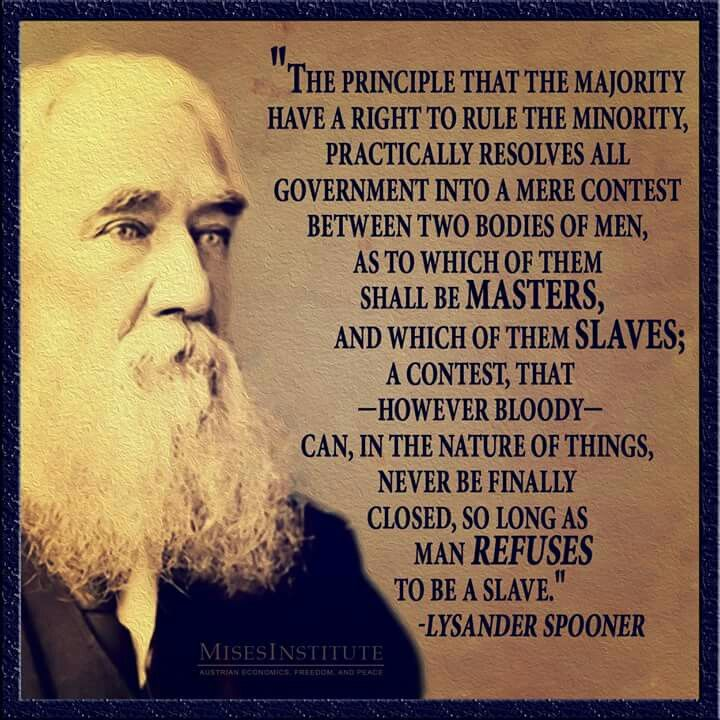
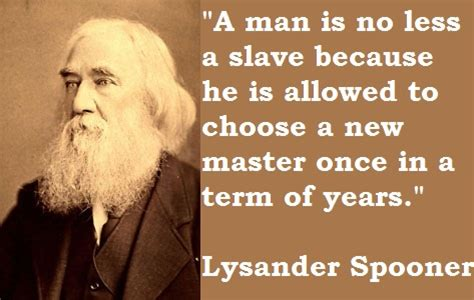
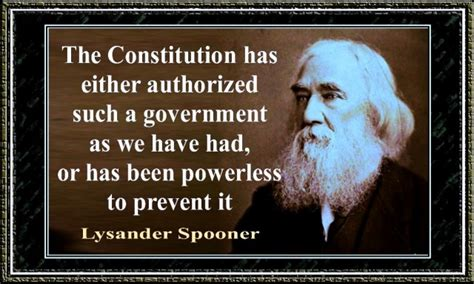
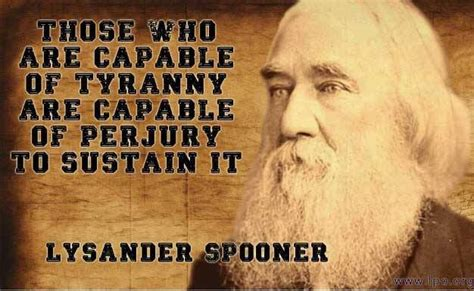
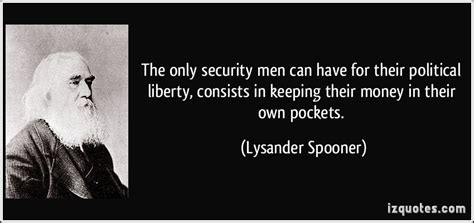
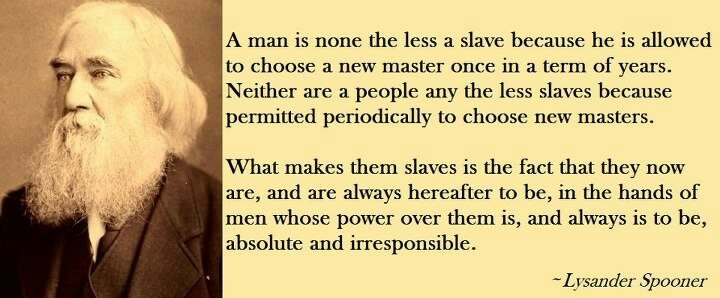
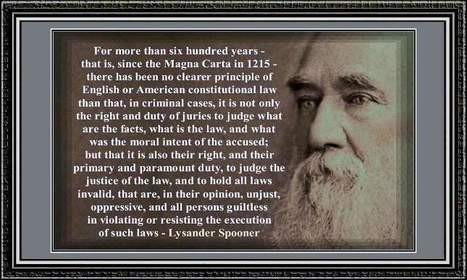
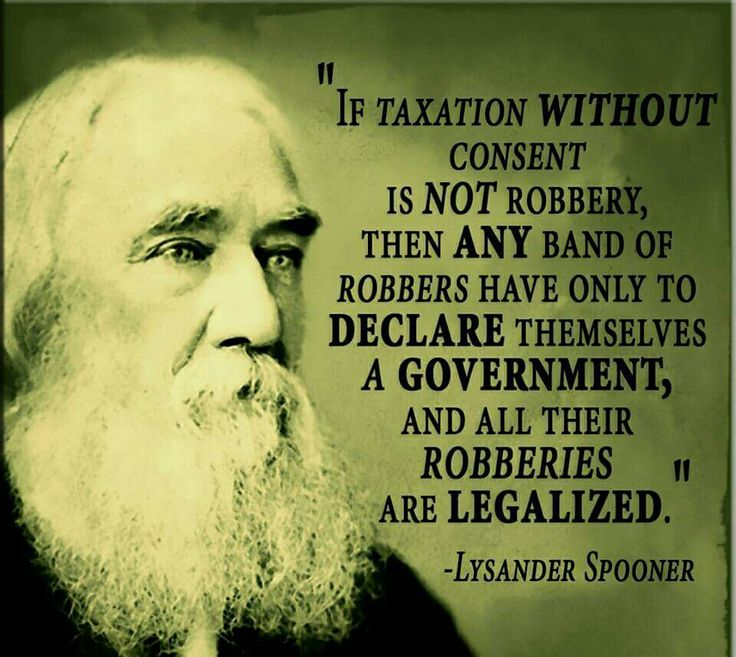
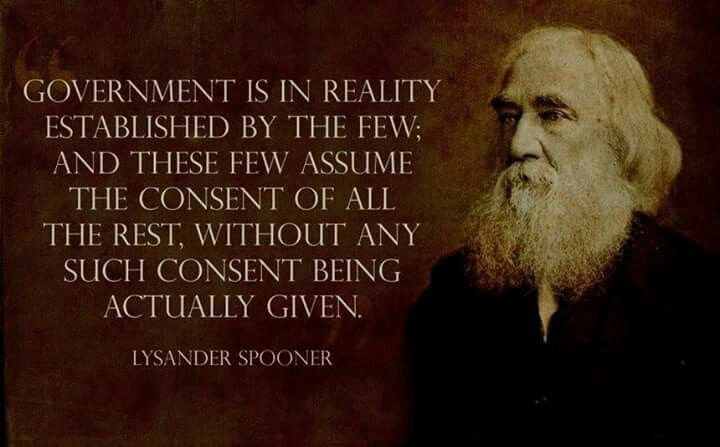
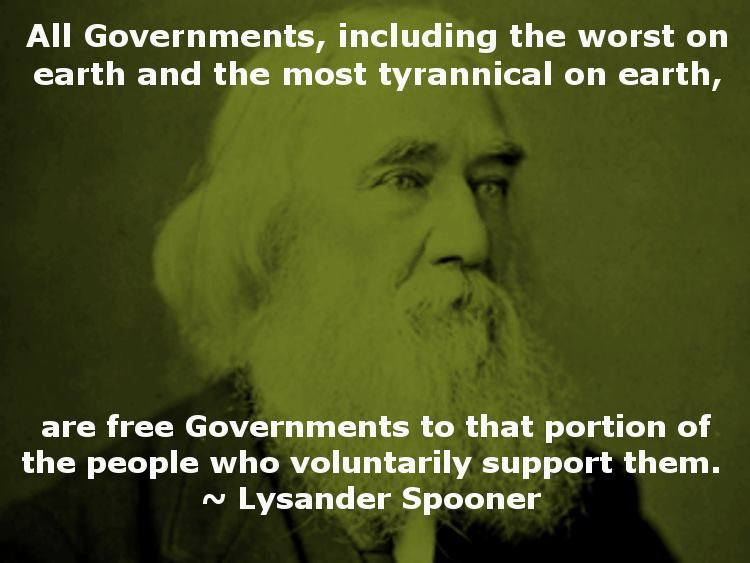
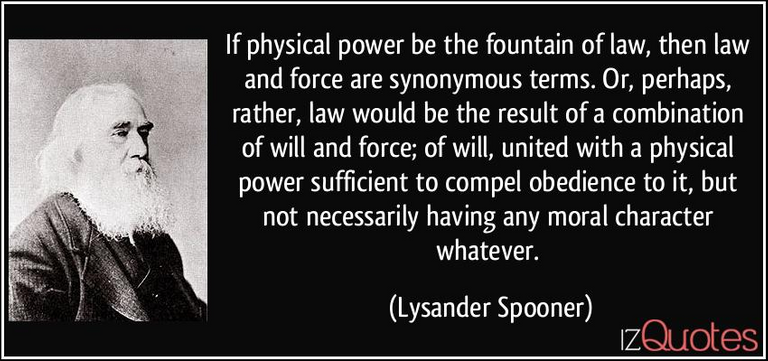
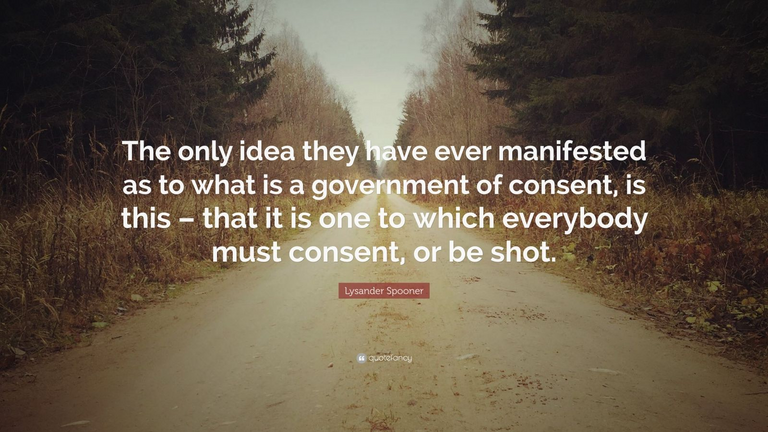
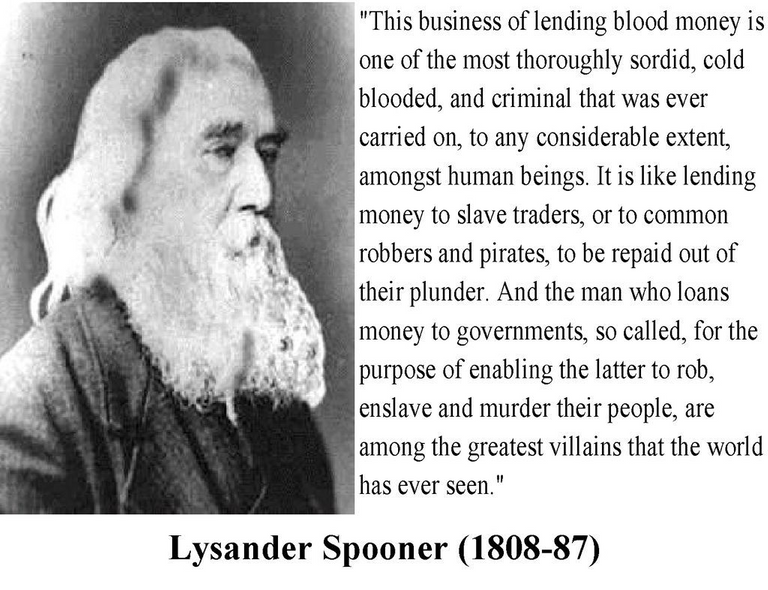
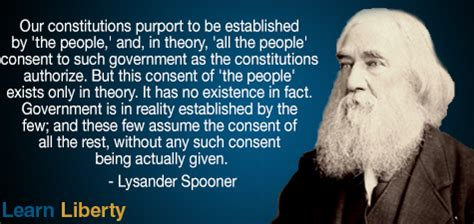
When I think of #deepdives this is the type of post I imagine. This is why I don't publish as often to this community. If I am going to do so then it needs to go deep. Hopefully those of you that agree with me on this find this post worthy of the tag.
Well I've had 9 months to do a write up like this, and I haven't, so I can't complain. But we named our 3rd son Spooner, in his honor. We also have a Hayek ;)
I appreciate the write up.
Nice. :) Good names.
The Constitution of No Treason changed me.
By the time I first encountered it I had made most of the journey to where it seems to go. I hadn't really formulated it into anything cohesive. It was all instinct. That book helped to think about it in a more orderly and reasoned fashion.
EDIT: If I had read it two or three years earlier though the journey would have been pretty profound. My mind had gone through a lot of transformation during that time.
I discovered this great author last year. And I have changed my mentality a lot and I have understood the idea of freedom better. In Venezuela it is very difficult if not impossible to find literature about him or about him. From what I have seen comments on his books and thoughts by other people who have read it. I think you have to make it known around the world.
Ok, my ex-bf is the president of the Mises Institute in my country and he never got me so interested in reading Lysander's work as you did!
Gotta get down to it!
I respect the Mises Institute and would be comfortable talking with them but I myself am just an individual. I am not part of any group. :) I like to move, be free, and change my mind on a whim.
Sure, I don't mind people having opinions!
What I meant was that you talked so well about it that now I have to do some reading myself!
Yeah I took it as a compliment. :) Thank you.
I clicked on this thinking he might have been the inventor of spoonerisms which my father and I used to love to use. Turns out he's not.

Nonetheless your man is much more interesting and I learned something new today. Yes this is a deep dive and it's good.
Hah... I've heard "Spoonerism" before but never stopped to see what it means.
And yes... Lysander Spooner is an interesting guy. He liked to throw a wrench into the workings of authority.
Yeh have reblogged so i can peruse at my leisure, I didn't realise libertarian was a euphemism for anarchist? I'd class myself as an anarchist bottom line.
Nah... Libertarians are CLOSE to anarchism. Libertarians want to minimize the amount of laws to an absolute minimum. At least some of them. Like any party there are factions.
Technically I am still a Libertarian. I tend to call myself a Minarchist or a Voluntaryist.
I think there need to be a minimum set of rules. For example I do not consider the Non-Aggression Principle to be optional. Thus, that would be a rule.
Anarchy requires that there are no rulers and by extension no rules.
I think there need to be some rules but I suspect we could get them to such a low number that pretty much anyone would know what they are and understand them. Lawyers would hate that.
Now the Libertarian party usually referred to themselves as "Fiscally conservative, and socially liberal" and by those labels they are not referring to the bastardized versions of the words liberal and conservative of today.
During Lysander's time things were quite different.
Anarchy is not about no rules at all. The common law always stands, 'rulers' or 'governemnt' are just administrators. They are managers of the economy and their written rules are not laws. There are only 3 valid laws and they are common law/natural law. Everything else is rules of society. Yeh I guess conservatives are closer to libertarian except in uk the cons are now just as leftist as labour and both are pretty much fascist.
As far as I know it Anarchy is derived from An Archos which means "No Rulers".
It doesn't define any rules. Common law, common justice, natural law, natural justice, etc... I think you'll find it ends up being interpreted VERY subjectively.
Natural Law and things like that still fit within what I myself call Minarchist. Minimal set of rules. :)
Yet that is my subjective interpretation.
Anarchy is the rejection of governmental authority and societal hierarchy. Nothing to do with lawlessness.
But- It also has become a synonym for chaos and disorder. Probably propaganda.
Your content has been voted as a part of Encouragement program. Keep up the good work!
Use Ecency daily to boost your growth on platform!
Support Ecency
Vote for Proposal
Delegate HP and earn more